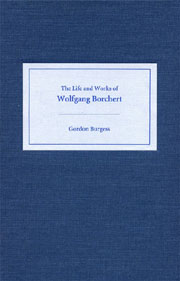Book contents
- Frontmatter
- Contents
- Acknowledgments
- List of Abbreviations
- Introduction
- 1 Childhood, School, Apprenticeship: 1921–1940
- 2 “The Happiest Time of My Life': January–June 1941
- 3 The Eastern Front and Courts-Martial: 1941–1943
- 4 Actor Turned Writer: Jena, Hamburg, and Basel: 1944–1947
- 5 The Poems
- 6 Draussen vor der Tür
- 7 The Short Stories
- 8 The Reception of Borchert's Life and Works
- Conclusion
- Published Works Cited
- Index
8 - The Reception of Borchert's Life and Works
Published online by Cambridge University Press: 05 February 2013
- Frontmatter
- Contents
- Acknowledgments
- List of Abbreviations
- Introduction
- 1 Childhood, School, Apprenticeship: 1921–1940
- 2 “The Happiest Time of My Life': January–June 1941
- 3 The Eastern Front and Courts-Martial: 1941–1943
- 4 Actor Turned Writer: Jena, Hamburg, and Basel: 1944–1947
- 5 The Poems
- 6 Draussen vor der Tür
- 7 The Short Stories
- 8 The Reception of Borchert's Life and Works
- Conclusion
- Published Works Cited
- Index
Summary
The Ossification of Borchert's Image
THE POPULAR IMAGE OF Borchert and his work was created from several elements: the first productions of Draussen vor der Tür as a radio play in the winter/spring of 1947 and as a stage play from November 1947 onward; his early death; and the publication of the Gesamtwerk in 1949. The image was to prove a lasting one. In the public imagination, Borchert and his work quickly became summed up in three terms: “Schrei,” “Verzweiflung,” and “Nihilist/Nihilismus,” the last set generally modified by an epithet such as “positiv.” These labels have endured, with minor variations, ever since. The purpose of this chapter is to trace the way in which Borchert's image was created soon after his death and then became petrified through the repetition of unexamined clichés at all critical levels, from newspaper articles, including, especially, reviews of productions of Draussen vor der Tür, to scholarly investigations.
Wolfgang Borchert's work came to the attention of the public at large not as a written text but as an acoustic experience, with the final, desperate words of Draussen vor der Tür in the original production being shouted out at the radio listener. This is already reflected in the earliest reviews of this broadcast: “die brennenden Fragen des jungen Heimkehrers […]sind […]der Notschrei der jungen Menschen, die so gern ‘Ja’ sagen möchten”; “Er [= Borchert] will uns […]vor dem Abgrund, an dessen Rand wir stehen, durch einen Aufschrei zurückreißen”; “Das Hörspiel hat die Verzweiflungsatmosphäre deutscher Bahnhofsbunker.”
- Type
- Chapter
- Information
- The Life and Works of Wolfgang Borchert , pp. 219 - 233Publisher: Boydell & BrewerPrint publication year: 2003

